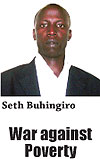Poverty has been the subject of discussion millennia. Economists have long argued that people are poor because of a low level of savings. Their argument is deeply rooted in the concept of vicious cycle of poverty. This concept holds that low productivity leads to low income, low income leads to low savings, and low savings leads to low investment and low investment to low productivity.


Poverty has been the subject of discussion millennia. Economists have long argued that people are poor because of a low level of savings.
Their argument is deeply rooted in the concept of vicious cycle of poverty. This concept holds that low productivity leads to low income, low income leads to low savings, and low savings leads to low investment and low investment to low productivity.
According to a World Bank report on Gender, Poverty and Environmental Indicators on Africa (2002-2003), the major causes of poverty vary across different countries.
The report stressed that the main factors behind chronic poverty in Africa is low levels of production technology, the high illiteracy rates and the under-developed rural infrastructure.
I believe the time has come for Africans to break away from the vicious cycle of poverty. The irony of Africa’s problem is that, the continent is the richest continent in terms of resources in the world.
Available statistics confirm that Africa has 99% of the world’s chrome reserves, 85% of the platinum reserves, 70% of the tantalite reserves, 68% of the cobalt reserves and 54% of the gold reserves.
This situation has led many social commentators to argue that it is politically wrong, economically unjustifiable, socially immoral and intellectually intolerable for Africa to still suffer from the ills of poverty.
It is in this light that I call upon Rwandans to embrace the concept known as the ‘virtuous cycle of wealth creation’. This is a time-honored key to breaking away from the vicious cycle of poverty.
The virtuous cycle of wealth creation draws its validation from the Biblical maxim "wealth obtained by fraud dwindles but one who gathers by labor increases it” (Proverbs 13:11).
The main thrust of this concept is that with a little bit of sacrifice and hard work on the part of the leadership and citizens of a nation, a low income economy can change into a high savings economy over time. An increase in savings is a prerequisite for a corresponding increase in investment.
Even though a country is poor, putting a small amount of money aside as savings through the principle of compounding interest will enable it to be transformed from a low-income country into a middle-income country over time. Encouraging people to save, no matter how little their income, is a sine quo non for accelerating Rwanda’s economic development.
Evidence shows that most of the economic development that took place in the East can be attributed to a strong internal resource mobilization and a high level of savings.
The Book of Proverbs states "the wise man saves for the future but the foolish man spends whatever he gets”.
Imagine a scenario where at least two million Rwandans decided to save and invest 20,000 francs a month. In one month we could mobilize 40 billion francs!
Assuming we invested this amount in the equity market at a rate of 20 per cent per annum we would get 576 billion francs .At the current Exchange rate of 575frw to a dollar we should be expecting around $1,001,739,130 per year.
Imagine if we channeled this amount of money into developmental project… we have been sitting on pure gold and crying about poverty.
First of all there is the need for us to change our attitude towards work and respect the dignity of labor. Secondly no matter how small our income, we can still create a comfortable future for our selves and families by embracing the concept of the virtuous cycle of wealth creation. Let us quit the talk shop and dream shop and start investing today.
Seth Buhingiro is a social commentator


